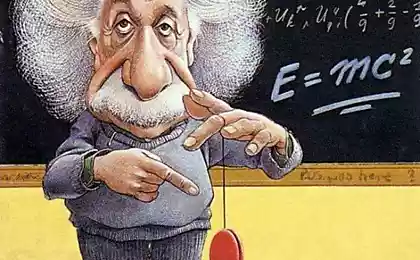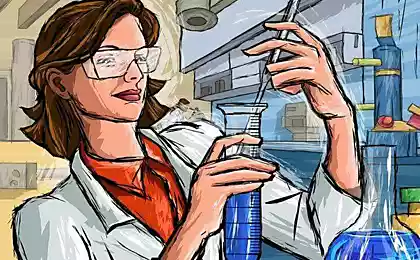511
The Ghost of freedom: how the laws of nature determine our daily choices
Forty five million forty eight thousand six hundred eighty
The question of free will and the factors limiting its occupied thinkers for centuries. Even Benedict Spinoza believed that "freedom is the recognition of necessity." The picture was becoming more difficult and paradoxical to the extent that, in addition to religious, social and cultural constraints surfaced new psychological and biological laws. The results of current research does not leave much room for illusions: our genes themselves, we look for suitable partners, gut bacteria is determined diet and neurotransmitter dopamine affects willingness to agree with others. The most vivid examples of how the material world affects our decisions:
Genes
The phrase "man is the Tsar of nature" the theory of evolution uncompromisingly specifies: the overlords of all the vital processes are still genes. They, for example, trying to find us the best partner in life, that they might duplicate itself in a healthy offspring.
This is evidenced by a recent study of American scientists who analyzed the DNA of 825 pairs, in which the spouses were born from 1930 to 1950 and still have a stable relationship. It was found that genes of husband and wife is much more similar to each other than any other DNA arbitrary pair of men and women. There is evidence that unconscious DNA analysis for compatibility comes immediately after the first kiss and the inevitable exchange of saliva.
The same applies to friends — rather, they have chosen not you, and your genes. The results of research scientists from Yale University and the University of California in San Diego say that friends have about 1% of common genes, the same associates and relatives in the fifth generation. It was also found that people prefer to communicate with those with whom they have the same perception of odors, but it differs immunity. The last criterion is another evolution of the invented method to protect a population. Still correct strategically to suddenly came the disease struck individuals, and not once the whole group United friendly feelings.
Genes are fighting for effective reproduction in many aspects influence what will be the next generation. For example, the heritability of intelligence ranges from 52 to 72%. Thus, if in youth IQ may vary from expected levels due to the influence of environment, genes with age take their toll — it turns out they like to choose their own suitable for the maximum spread setting.
In addition, features of human nature — for example, susceptibility to stress, too, are the result of the genes. Such findings made by American scientists who have studied the behavior of mice placed in uncomfortable conditions (they tilted the cage with a rodent, changed lighting, restricted the mobility of the animals). About forty percent of the "subjects" were unable to cope with a stressful situation, the fact is that due to reduced gene expression in their hippocampus wasn't developed mGlu2 protein which is a marker of resistance to a changing environment.
Laboratory mice has contributed to the study on transfer from one generation to the traumatic experience. On the floor of the cage, which smelled of cherries, fed the electric discharge mice received an electric shock. So that at the next meeting with the same scent animals did not venture to move. The American biologists who made the experiment, found that memory of traumatic event was transmitted through the male line: sons and grandsons of the first hit by the current males too cautious stopped, sensing a dangerous smell.
Sociologists from Harvard went ahead and destroyed the idea of the possibility to freely choose their place in life. They analyzed the social status of 1100 pairs of identical and fraternal twins and found that the first genetically identical to occupy the same place in the social group, unlike the second, whose genome as a normal brothers and sisters, only partially coincide. Level of popularity, ie the number of people willing to call you a friend, too, was not a personal achievement but the result of the genes.
The bacteria In early July in the scientific journal Biology Direct has published an article in which a group of Russian-American scholars put forward, and plays with a bold hypothesis — the propensity of man to religion fueled by certain bacteria living inside his body. How? Why do we need bacteria? It is not absolutely clear. But scientists say that bacteria can excrete substances that enhance religious feelings.
This alarming article for a long time to discuss, but one fact remains indisputable: the trillions of bacteria living inside us, use the human body is exceptional in their own interests. For example, what is the sneeze or cough with a cold? Inevitable symptoms and simultaneously "programmed" beneficial microbe him conduct the body tries to get rid of pathogens and simultaneously infect dozens of other people in the subway or at work.
The human microbiome (the so-called the collection of all microorganisms inside the human body) includes three thousand different species of bacteria. Most of them live in the gastrointestinal tract, feed us the same food and even have their own taste preferences. If the composition of the food ratios of protein, carbohydrates and other nutrients — suitable for development of bacteria, it encourages its host, releasing chemicals that improve the health of the person. If the diet of her not liking, in case, by contrast, are toxins the bacteria so sly form taste, which we sometimes are so proud of, and is determined by our diet.
Immune and digestive system can not work without the symbiotic bacteria. But why not share some of these mortal automatic functions with our young roommates? Much more painful that they affect our nervous system: a study led by Professor Peterson at the Karolinska University in Stockholm, shows that in the absence of bacteria can not be normal development of the brain.
However, these experiments was not on humans, but on mice who were raised in a sterile environment. As a result, they were very different from their relatives were restless, nervous and reckless. When this normal behavior did not return even after returning to normal, "bacterial" environment, because during the formation of the brain intestinal symbionts help the formation of contacts between neurons and also regulate the concentration of neurotransmitters. Confirmed these findings and data analysis of biochemical regulation of the activity of almost forty genes involved in brain activity lies with the bacteria.
How does it happen? How bacteria can activate or repress certain genes? How are substances secreted in the intestine, reach the brain? To the end is not clear yet, but we already know that even the development of, for example, autism is not without symbiotic bacteria: people with this or other psychological disorders varies intestinal microflora. Therefore, even developed biochemical tests for autism on the analysis of different products of metabolism.
In one teaspoonful of water floats five million bacteria and fifty million viruses and microbes are about eighty percent of the entire biomass of the Earth. Not surprisingly, many scientists like to show off idea that our entire biosphere is only a convenient system for the exchange of genes between different organisms.
Moreover, in each human cell (as in almost all multicellular organisms) can be found to thousands of mitochondria small organelles responsible for cellular respiration. Their DNA differs from the DNA the rest of the body, because many thousands of years ago, mitochondria were still living independently bacteria. Time passed, and now it's not even symbionts, and components of our cells.
Parasites American biologist Nathan Cobb once suggested that the world would save their vague outlines, even if it suddenly disappeared all matter except the round worms-nematodes. Trees, flowers, animals turns out, all living things around us affected by parasites, which we often do not notice. That is, if the subject's behavior is very different from the usual and exposed him to the obvious risk, it is possible that the culprit of such tricks is a parasite that controls the actions of the host by using different chemicals.
For example, a flatworm Echinococcus multilocularis is so eager to move out of the body of its host, the mouse, into the body of another Fox, which makes the unfortunate rodent slow and clumsy; faithful prey for any predator. Nematode Myrmeconema neotropicum cause ants to become similar in appearance to red berries, a favorite treat they need birds. The worm the hairy shape-shifter and is pushing their hosts to suicide. Its larvae penetrate the grasshoppers and crickets when they drink contaminated water. Then the larvae grow, dominate the Central nervous system of the host, and as a result drugged insects themselves jumping into the water, closing the life cycle of nematodes.
Travel some other parasites even more confusing. So, first Toxoplasma lives in rodents. Infected individuals are no longer afraid of cats and even excited by the smell of their urine. In the result, Tom finally catch Jerry, and Toxoplasma finds its main host to breed this parasite can only in cats. And already on cute Pets may well pass Toxoplasma and humans.
In infected people is markedly different behavior: they are more likely to lose self-control, inclined to commit acts of uncontrolled, constantly in trouble and doubt their abilities. Moreover, toxoplasmosis still slows human response. All together, this often leads to disastrous results, scientists specifically studied samples 146 people, victims of car accidents, and found that most of them were infected with this parasite.
Most interesting is that, according to official statistics, almost Toxoplasma infected 50% of the population. (For different countries, this value is very different. For example, in South Korea infected only about 4% of the population, and in Brazil all 67%). Kind of makes you wonder why some people prefer adventure, adrenaline and eternal quest and others enough of the TV remote.
Neurons How a person makes a decision? In 1985, the answer to this question is sought American neuroscientist Benjamin Libet. He was interested in the place of conscious thought in the successive chain of neural processes leading to action.
On the heads of the students, volunteered to participate in the experiment, he installed sensors EEG that recorded any activity in the brain, and then asked subjects to move his fingers. It is important that Libet left freedom to the participants — they could move it anytime, and not in response to special stimulus. But the students had to mark the point when it came to them wanting to do it. A device EEG connected to the meter time, sets the period of occurrence of the readiness potential burst of activity in the cerebral cortex, which precedes conscious action.
Against expectations it turned out that the subjects repeatedly reported its desire to lift a finger for 350 to 400 milliseconds later than the decision "took" neurons (when there was a spike on the EEG).
In 2008 a group of German neuroscientists has made impressive update data received by Libata. By placing subjects in an MRI scanner, the researchers asked them to look at the screen from appearing on it letters and randomly press left or right key. The participants had to memorize the symbol, seeing that, they wanted to make the move, and re-select it with a control issue. In contrast to the experiments 80s, where the potential willingness were detected in the supplementary motor area in just a moment before a conscious decision in the new study, researchers recorded brain activity in the frontal cortex is already seven seconds before you press. These data put into question the idea that man can control his behavior. The brain decides how to proceed. Informed choice behavior is only an illusion that conceals real processes occurring in the human mind independently of themselves.
This fact affects even on whether who wants to lose weight, to stay on the diet. The better he developed frontal cortex responsible for rational behavior, the higher the chances of success. The thickness of this zone depends person can postpone compensation in time. At the same time, the pleasure center declines to do so, to get an immediate sense of euphoria. Scientists today studying the behavior, say the decision is a threshold activity of certain neurons that signal the motor cortex on the launch of the rational or emotional behavior.
Neurotransmitters in addition, neurons that define our desires, they source of various sensations. More precisely, a function neurotransmitters are chemicals that provide transmission of electrical discharge on synapses, the processes connecting nerve cells.
The discovery of neurotransmitters has had on 1960-e years were a time of rapid flourishing of neuroscience. It turned out that the feeling of joy and euphoria depends on the amount of serotonin in the brain, and depression or even a slight gloom consequence not of bad character, but a lack of this substance. Another neurotransmitter, dopamine, causes us to not reach high goals, and simple, dictated by evolution, needs food and sex. This substance is responsible for the feeling of pleasure, which is particularly acute in such moments. In addition, it is involved in the decision-making process.
Russian neuroeconomist Vasily klucharev of Higher school of Economics researched why people tend to conform and often change their minds under pressure opinion of others. He suggested subjects to rate the attractiveness of faces on a scale from one to eight. After the participants have done this, they showed the ratings of other people — otherwise, many of the participants within the hour changed his point of view. It turned out that at the time of making the "wrong" that is different from conventional solutions, in the human brain activated center recognition errors, and the pleasure center, in contrast, is blocked we feel very uncomfortable. The brain requires urgently abandon extravagant behavior and subsequently reward us for conformity cozy feeling of satisfaction. The higher the level of dopamine, the better developed the system of rewards and punishments.
"The mediator of wakefulness" — norepinephrine — also significantly influences our behavior. Despite the fact that the number of molecules is not very large, it depends from the norepinephrine concentration, energy, motivation to action, serenity, visual memory, mood, and our behavior in a moment of danger. So the discovery of neurotransmitters raises serious doubt that we are the masters of their feelings.
Quantum epilogue Many of the key processes in the human body occur at such small scales, which already begin to act probabilistic laws of quantum mechanics. Quantum randomness determine what will be the sex of the baby (carrier which chromosome is the luckiest sperm), or when the axon will run the discharge of nerve impulses. So in place of the disappointing lack of freedom and all come complete chaos, only covered with artful design neuronal genes, psychological patterns and cultural codes that are constantly pulling us in different directions.published
Source: theoryandpractice.ru
The question of free will and the factors limiting its occupied thinkers for centuries. Even Benedict Spinoza believed that "freedom is the recognition of necessity." The picture was becoming more difficult and paradoxical to the extent that, in addition to religious, social and cultural constraints surfaced new psychological and biological laws. The results of current research does not leave much room for illusions: our genes themselves, we look for suitable partners, gut bacteria is determined diet and neurotransmitter dopamine affects willingness to agree with others. The most vivid examples of how the material world affects our decisions:
Genes
The phrase "man is the Tsar of nature" the theory of evolution uncompromisingly specifies: the overlords of all the vital processes are still genes. They, for example, trying to find us the best partner in life, that they might duplicate itself in a healthy offspring.
This is evidenced by a recent study of American scientists who analyzed the DNA of 825 pairs, in which the spouses were born from 1930 to 1950 and still have a stable relationship. It was found that genes of husband and wife is much more similar to each other than any other DNA arbitrary pair of men and women. There is evidence that unconscious DNA analysis for compatibility comes immediately after the first kiss and the inevitable exchange of saliva.
The same applies to friends — rather, they have chosen not you, and your genes. The results of research scientists from Yale University and the University of California in San Diego say that friends have about 1% of common genes, the same associates and relatives in the fifth generation. It was also found that people prefer to communicate with those with whom they have the same perception of odors, but it differs immunity. The last criterion is another evolution of the invented method to protect a population. Still correct strategically to suddenly came the disease struck individuals, and not once the whole group United friendly feelings.
Genes are fighting for effective reproduction in many aspects influence what will be the next generation. For example, the heritability of intelligence ranges from 52 to 72%. Thus, if in youth IQ may vary from expected levels due to the influence of environment, genes with age take their toll — it turns out they like to choose their own suitable for the maximum spread setting.
In addition, features of human nature — for example, susceptibility to stress, too, are the result of the genes. Such findings made by American scientists who have studied the behavior of mice placed in uncomfortable conditions (they tilted the cage with a rodent, changed lighting, restricted the mobility of the animals). About forty percent of the "subjects" were unable to cope with a stressful situation, the fact is that due to reduced gene expression in their hippocampus wasn't developed mGlu2 protein which is a marker of resistance to a changing environment.
Laboratory mice has contributed to the study on transfer from one generation to the traumatic experience. On the floor of the cage, which smelled of cherries, fed the electric discharge mice received an electric shock. So that at the next meeting with the same scent animals did not venture to move. The American biologists who made the experiment, found that memory of traumatic event was transmitted through the male line: sons and grandsons of the first hit by the current males too cautious stopped, sensing a dangerous smell.
Sociologists from Harvard went ahead and destroyed the idea of the possibility to freely choose their place in life. They analyzed the social status of 1100 pairs of identical and fraternal twins and found that the first genetically identical to occupy the same place in the social group, unlike the second, whose genome as a normal brothers and sisters, only partially coincide. Level of popularity, ie the number of people willing to call you a friend, too, was not a personal achievement but the result of the genes.
The bacteria In early July in the scientific journal Biology Direct has published an article in which a group of Russian-American scholars put forward, and plays with a bold hypothesis — the propensity of man to religion fueled by certain bacteria living inside his body. How? Why do we need bacteria? It is not absolutely clear. But scientists say that bacteria can excrete substances that enhance religious feelings.
This alarming article for a long time to discuss, but one fact remains indisputable: the trillions of bacteria living inside us, use the human body is exceptional in their own interests. For example, what is the sneeze or cough with a cold? Inevitable symptoms and simultaneously "programmed" beneficial microbe him conduct the body tries to get rid of pathogens and simultaneously infect dozens of other people in the subway or at work.
The human microbiome (the so-called the collection of all microorganisms inside the human body) includes three thousand different species of bacteria. Most of them live in the gastrointestinal tract, feed us the same food and even have their own taste preferences. If the composition of the food ratios of protein, carbohydrates and other nutrients — suitable for development of bacteria, it encourages its host, releasing chemicals that improve the health of the person. If the diet of her not liking, in case, by contrast, are toxins the bacteria so sly form taste, which we sometimes are so proud of, and is determined by our diet.
Immune and digestive system can not work without the symbiotic bacteria. But why not share some of these mortal automatic functions with our young roommates? Much more painful that they affect our nervous system: a study led by Professor Peterson at the Karolinska University in Stockholm, shows that in the absence of bacteria can not be normal development of the brain.
However, these experiments was not on humans, but on mice who were raised in a sterile environment. As a result, they were very different from their relatives were restless, nervous and reckless. When this normal behavior did not return even after returning to normal, "bacterial" environment, because during the formation of the brain intestinal symbionts help the formation of contacts between neurons and also regulate the concentration of neurotransmitters. Confirmed these findings and data analysis of biochemical regulation of the activity of almost forty genes involved in brain activity lies with the bacteria.
How does it happen? How bacteria can activate or repress certain genes? How are substances secreted in the intestine, reach the brain? To the end is not clear yet, but we already know that even the development of, for example, autism is not without symbiotic bacteria: people with this or other psychological disorders varies intestinal microflora. Therefore, even developed biochemical tests for autism on the analysis of different products of metabolism.
In one teaspoonful of water floats five million bacteria and fifty million viruses and microbes are about eighty percent of the entire biomass of the Earth. Not surprisingly, many scientists like to show off idea that our entire biosphere is only a convenient system for the exchange of genes between different organisms.
Moreover, in each human cell (as in almost all multicellular organisms) can be found to thousands of mitochondria small organelles responsible for cellular respiration. Their DNA differs from the DNA the rest of the body, because many thousands of years ago, mitochondria were still living independently bacteria. Time passed, and now it's not even symbionts, and components of our cells.
Parasites American biologist Nathan Cobb once suggested that the world would save their vague outlines, even if it suddenly disappeared all matter except the round worms-nematodes. Trees, flowers, animals turns out, all living things around us affected by parasites, which we often do not notice. That is, if the subject's behavior is very different from the usual and exposed him to the obvious risk, it is possible that the culprit of such tricks is a parasite that controls the actions of the host by using different chemicals.
For example, a flatworm Echinococcus multilocularis is so eager to move out of the body of its host, the mouse, into the body of another Fox, which makes the unfortunate rodent slow and clumsy; faithful prey for any predator. Nematode Myrmeconema neotropicum cause ants to become similar in appearance to red berries, a favorite treat they need birds. The worm the hairy shape-shifter and is pushing their hosts to suicide. Its larvae penetrate the grasshoppers and crickets when they drink contaminated water. Then the larvae grow, dominate the Central nervous system of the host, and as a result drugged insects themselves jumping into the water, closing the life cycle of nematodes.
Travel some other parasites even more confusing. So, first Toxoplasma lives in rodents. Infected individuals are no longer afraid of cats and even excited by the smell of their urine. In the result, Tom finally catch Jerry, and Toxoplasma finds its main host to breed this parasite can only in cats. And already on cute Pets may well pass Toxoplasma and humans.
In infected people is markedly different behavior: they are more likely to lose self-control, inclined to commit acts of uncontrolled, constantly in trouble and doubt their abilities. Moreover, toxoplasmosis still slows human response. All together, this often leads to disastrous results, scientists specifically studied samples 146 people, victims of car accidents, and found that most of them were infected with this parasite.
Most interesting is that, according to official statistics, almost Toxoplasma infected 50% of the population. (For different countries, this value is very different. For example, in South Korea infected only about 4% of the population, and in Brazil all 67%). Kind of makes you wonder why some people prefer adventure, adrenaline and eternal quest and others enough of the TV remote.
Neurons How a person makes a decision? In 1985, the answer to this question is sought American neuroscientist Benjamin Libet. He was interested in the place of conscious thought in the successive chain of neural processes leading to action.
On the heads of the students, volunteered to participate in the experiment, he installed sensors EEG that recorded any activity in the brain, and then asked subjects to move his fingers. It is important that Libet left freedom to the participants — they could move it anytime, and not in response to special stimulus. But the students had to mark the point when it came to them wanting to do it. A device EEG connected to the meter time, sets the period of occurrence of the readiness potential burst of activity in the cerebral cortex, which precedes conscious action.
Against expectations it turned out that the subjects repeatedly reported its desire to lift a finger for 350 to 400 milliseconds later than the decision "took" neurons (when there was a spike on the EEG).
In 2008 a group of German neuroscientists has made impressive update data received by Libata. By placing subjects in an MRI scanner, the researchers asked them to look at the screen from appearing on it letters and randomly press left or right key. The participants had to memorize the symbol, seeing that, they wanted to make the move, and re-select it with a control issue. In contrast to the experiments 80s, where the potential willingness were detected in the supplementary motor area in just a moment before a conscious decision in the new study, researchers recorded brain activity in the frontal cortex is already seven seconds before you press. These data put into question the idea that man can control his behavior. The brain decides how to proceed. Informed choice behavior is only an illusion that conceals real processes occurring in the human mind independently of themselves.
This fact affects even on whether who wants to lose weight, to stay on the diet. The better he developed frontal cortex responsible for rational behavior, the higher the chances of success. The thickness of this zone depends person can postpone compensation in time. At the same time, the pleasure center declines to do so, to get an immediate sense of euphoria. Scientists today studying the behavior, say the decision is a threshold activity of certain neurons that signal the motor cortex on the launch of the rational or emotional behavior.
Neurotransmitters in addition, neurons that define our desires, they source of various sensations. More precisely, a function neurotransmitters are chemicals that provide transmission of electrical discharge on synapses, the processes connecting nerve cells.
The discovery of neurotransmitters has had on 1960-e years were a time of rapid flourishing of neuroscience. It turned out that the feeling of joy and euphoria depends on the amount of serotonin in the brain, and depression or even a slight gloom consequence not of bad character, but a lack of this substance. Another neurotransmitter, dopamine, causes us to not reach high goals, and simple, dictated by evolution, needs food and sex. This substance is responsible for the feeling of pleasure, which is particularly acute in such moments. In addition, it is involved in the decision-making process.
Russian neuroeconomist Vasily klucharev of Higher school of Economics researched why people tend to conform and often change their minds under pressure opinion of others. He suggested subjects to rate the attractiveness of faces on a scale from one to eight. After the participants have done this, they showed the ratings of other people — otherwise, many of the participants within the hour changed his point of view. It turned out that at the time of making the "wrong" that is different from conventional solutions, in the human brain activated center recognition errors, and the pleasure center, in contrast, is blocked we feel very uncomfortable. The brain requires urgently abandon extravagant behavior and subsequently reward us for conformity cozy feeling of satisfaction. The higher the level of dopamine, the better developed the system of rewards and punishments.
"The mediator of wakefulness" — norepinephrine — also significantly influences our behavior. Despite the fact that the number of molecules is not very large, it depends from the norepinephrine concentration, energy, motivation to action, serenity, visual memory, mood, and our behavior in a moment of danger. So the discovery of neurotransmitters raises serious doubt that we are the masters of their feelings.
Quantum epilogue Many of the key processes in the human body occur at such small scales, which already begin to act probabilistic laws of quantum mechanics. Quantum randomness determine what will be the sex of the baby (carrier which chromosome is the luckiest sperm), or when the axon will run the discharge of nerve impulses. So in place of the disappointing lack of freedom and all come complete chaos, only covered with artful design neuronal genes, psychological patterns and cultural codes that are constantly pulling us in different directions.published
Source: theoryandpractice.ru
In Las Vegas presents a three-wheeled vehicle Pedalist
The power of prayer —what is happening at the time of such action
























